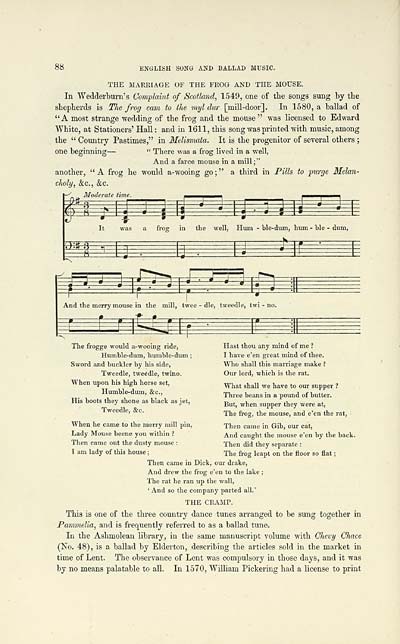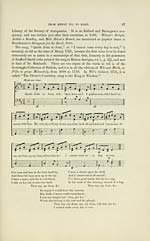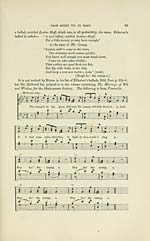Glen Collection of printed music > Printed text > Popular music of the olden time > Volume 1
(122) Page 88 - Marriage of the the frog and the mouse
Download files
Complete book:
Individual page:
Thumbnail gallery: Grid view | List view

88
ENGLISH SONG AND BALLAB MUSIC.
THE MARRIAGE OF THE FROG AND THE MOUSE.
In Wedderburn's Complaint of Scotland, 1549, one of the songs sung by the
shepherds is Tlie frog cam to the myl dur [mill-door]. In 1580, a ballad of
"A most strange wedding of the frog and the mouse" was licensed to Edward
White, at Stationers' Hall : and in 1611, this song was printed with music, among
the " Country Pastimes," in Melismata. It is the progenitor of several others ;
one beginning — " There was a frog lived in a well,
And a farce mouse in a mill ;"
another, "A frog he would a- wooing go;" a third in Fills to purge Melan-
choly, &c., &c.
Moderate time. m^^^^^^^ ^^—^
j-ff o ■ I I I I rn 1 II ^ I I .PT
i
5^
It
was a frog in the well, Hum - ble-dum, hum - ble - dum,
agff
^
i
^
And the merry mouse in the mill, twee - die, tweedle, twi - no.
^^
The frogge would a-wooing ride,
Humble-dum, humble-dum ;
Sword and buckler by his side,
Tweedle, tweedle, twino.
When upon his high horse set,
Humble-dum, &c..
His boots they shone as black as jet,
Tweedle, &c.
When he came to the merry mill pin.
Lady Mouse beene you within ?
Then came out the dusty mouse :
I am lady of this house ;
Hast thou any mind of me ?
I have e'en great mind of thee.
Who shall this marriage make ?
Our lord, which is the rat.
What shall we have to our supper ?
Three beans in a pound of butter.
But, when supper they were at.
The frog, the mouse, and e'en the rat.
Then came in Gib, our cat,
And caught the mouse e'en by the back.
Then did they separate :
The frog leapt on the floor so flat ;
Then came in Dick, our drake.
And drew the frog e'en to the lake ;
The rat he ran up the wall,
' And so the company parted all.'
THE CRAMP.
This is one of the three country dance tunes arranged to be sung together in
Pammelia, and is frequently referred to as a ballad tune.
In the Ashmolean library, in the same manuscript volume with Chevy Ohace
(No. 48), is a ballad by Elderton, describing the articles sold in the market in
time of Lent. The observance of Lent was compulsory in those days, and it was
by no means palatable to all. In 1570, William Pickering had a license to print
ENGLISH SONG AND BALLAB MUSIC.
THE MARRIAGE OF THE FROG AND THE MOUSE.
In Wedderburn's Complaint of Scotland, 1549, one of the songs sung by the
shepherds is Tlie frog cam to the myl dur [mill-door]. In 1580, a ballad of
"A most strange wedding of the frog and the mouse" was licensed to Edward
White, at Stationers' Hall : and in 1611, this song was printed with music, among
the " Country Pastimes," in Melismata. It is the progenitor of several others ;
one beginning — " There was a frog lived in a well,
And a farce mouse in a mill ;"
another, "A frog he would a- wooing go;" a third in Fills to purge Melan-
choly, &c., &c.
Moderate time. m^^^^^^^ ^^—^
j-ff o ■ I I I I rn 1 II ^ I I .PT
i
5^
It
was a frog in the well, Hum - ble-dum, hum - ble - dum,
agff
^
i
^
And the merry mouse in the mill, twee - die, tweedle, twi - no.
^^
The frogge would a-wooing ride,
Humble-dum, humble-dum ;
Sword and buckler by his side,
Tweedle, tweedle, twino.
When upon his high horse set,
Humble-dum, &c..
His boots they shone as black as jet,
Tweedle, &c.
When he came to the merry mill pin.
Lady Mouse beene you within ?
Then came out the dusty mouse :
I am lady of this house ;
Hast thou any mind of me ?
I have e'en great mind of thee.
Who shall this marriage make ?
Our lord, which is the rat.
What shall we have to our supper ?
Three beans in a pound of butter.
But, when supper they were at.
The frog, the mouse, and e'en the rat.
Then came in Gib, our cat,
And caught the mouse e'en by the back.
Then did they separate :
The frog leapt on the floor so flat ;
Then came in Dick, our drake.
And drew the frog e'en to the lake ;
The rat he ran up the wall,
' And so the company parted all.'
THE CRAMP.
This is one of the three country dance tunes arranged to be sung together in
Pammelia, and is frequently referred to as a ballad tune.
In the Ashmolean library, in the same manuscript volume with Chevy Ohace
(No. 48), is a ballad by Elderton, describing the articles sold in the market in
time of Lent. The observance of Lent was compulsory in those days, and it was
by no means palatable to all. In 1570, William Pickering had a license to print
Set display mode to: Large image | Transcription
Images and transcriptions on this page, including medium image downloads, may be used under the Creative Commons Attribution 4.0 International Licence unless otherwise stated. ![]()
| Special collections of printed music > Glen Collection of printed music > Printed text > Popular music of the olden time > Volume 1 > (122) Page 88 - Marriage of the the frog and the mouse |
|---|
| Permanent URL | https://digital.nls.uk/91368911 |
|---|---|
| Description | Also: The cramp |
| Shelfmark | Glen.254 |
|---|---|
| Additional NLS resources: | |
| Attribution and copyright: |
|
| Description | Scottish songs and music of the 18th and early 19th centuries, including music for the Highland bagpipe. These are selected items from the collection of John Glen (1833 to 1904). Also includes a few manuscripts, some treatises, and other books on the subject. |
|---|
| Description | The Glen Collection and the Inglis Collection represent mainly 18th and 19th century Scottish music, including Scottish songs. The collections of Berlioz and Verdi collected by bibliographer Cecil Hopkinson contain contemporary and later editions of the works of the two composers Berlioz and Verdi. |
|---|

